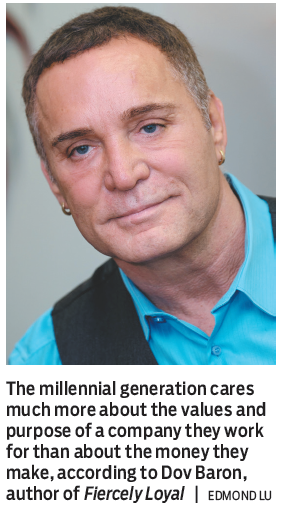Dov, Baron, the author of Fiercely Loyal: How High Performing Companies Develop and Retain Top Talent, sat down with Business in Vancouver recently to talk about how the rise of a new generation of workers is changing the way companies operate, and ways companies can keep their people for as long as possible.
Q: What is the No. 1 challenge employers face today compared to a decade ago?
A: The No. 1 challenge facing corporate business today is keeping top talent. The reason for that is because the balance of power has shifted. The balance of power used to be with the employer. It was very much an “I have the money and the power, you’ll do as I say” kind of situation. Now, the power is with the millennials.
Q: Why do the millennials hold more sway over employers now?
A: The reason for that is the Internet. First of all, the Internet has collapsed boundaries and borders. Many businesses now have people on their payroll who are not local to them; they can be scattered all over the place. The other side of it that’s a little more ominous is something that popped up during the crash of 2008 called the Occupy movement. It was a global movement and a foreshadowing of what’s to come. If you looked at that movement, it was mostly millennials, and their slogans were quite simple. It was that “we don’t trust big business” and “we don’t trust big banks” and “we don’t trust big government.”
Q: And the Occupy movement still has an effect?
A The tents might have been pulled up, but the movement hasn’t gone away. The suspicion of those things hasn’t disappeared. Now those who passively participated in the movement, through the news and TV, might feel an affinity with them and align with that distrust. Those same people are now looking for jobs, so many of them find themselves working with big business, but with a sense of not being able to trust them.
Q: How does that affect the balance of power you mentioned earlier?
A: With that distrust, and seeing their older family members lose the 10-to-15-year-long careers that they thought were rock-solid means that millennials took on the understanding that they were responsible for their own security. They don’t have the same loyalty to a company that you’d see from an employee from a few decades ago. The average millennial stays 1.2 years in a job.
Q: Why is that a significant change for employers?
A: When I go in to a company the first thing I say is, my job isn’t to help you find people for 15 to 20 years. That’s gone and it’s not coming back. However, the average company spends 1.5 to two times the annual salary of an individual training them, so an employee needs to work for two years just for you to get your money back. So the deal is very simple: we want to have them for at least two years, but ideally we want them for four. We found that is the longest a millennial is willing to stay.

Q: How do you solve that issue?
A: Two things: leadership and culture. The old style of leadership will not keep your people loyal. The old style was, “This is what I’ll say and that’s what you’ll do, if you don’t I’ll fire you.” Well, people just don’t want to put up with that anymore. The style of leadership now has to be authentic and transparent. You have to really get to know your people and you have to let them get to know who you are. That type of relational leadership is what keeps people loyal.
Culture has to be designed. Your company has to be united around a common purpose, a common cause, and that’s what makes the culture. Your culture is more important than your customers, than your bottom line. When your people are united around a common purpose, they are willing to put in more hours, work for less money and do more overtime. It’s what makes them fiercely loyal.
Q: Do you expect this shift in power balance to stay?
A: It’s absolutely here to stay, and it’s not my opinion, it’s actually fact. Millennials live at home longer than any previous generation, and what that means is that they’re not as driven by money. Millennials are driven by their values and purpose. They don’t care about the corner office; they’ve already got one, it’s called Starbucks. They want autonomy and they want to be heard. •




